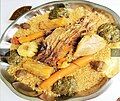Jollof rice (section Riz au gras)
as riz au gras. The Senegalese version, thieboudienne, has been recognized by UNESCO as an intangible cultural heritage dish. The Jolof or Wolof Empire...
27 KB (2,847 words) - 14:24, 13 August 2024
Thieboudienne (category Articles containing Wolof-language text)
Senegal. The version of tiep called thieboudienne, Ceebu Jën or chebu jen (Wolof: ceebu jën; French: thiéboudiène) is prepared with fish, broken rice and...
8 KB (799 words) - 11:43, 29 July 2024
whole of West Africa, especially Nigeria and Ghana amongst members of the Wolof ethnic group, from whom the word "jollof" originated. There are many variations...
20 KB (2,519 words) - 03:07, 29 July 2024
DOI inactive as of April 2024 (link) Guralnik (1984), p. ?. This is from Wolof dëgg or dëgga, meaning "to understand/appreciate" according to Smitherman...
89 KB (9,834 words) - 22:20, 2 August 2024
the language also inherited many words of different origins, among them Wolof, Fon, Kongo, English, Spanish, Portuguese, Taino and Arabic.[citation needed]...
127 KB (9,576 words) - 18:53, 30 July 2024
Americans Ambundu Baga Fula Igbo Jola Kissi Kongo Kpelle Limba Mandinka Mende Susu Temne Vai Wolof Serer Laalaa Ndut Niominka Noon Palor Saafi Toucouleur...
3 KB (277 words) - 20:17, 3 July 2023
Senegal (1849–1891): Named after a saint of the same name. The city's Wolof name is Ndar. Guinea-Bissau: Bissau Boe (1973–1974) Bolama (1879–1942)...
146 KB (20,055 words) - 15:00, 6 August 2024
The etymology of Carabane remains unclear. It could be connected to the Wolof word karabané, which means "who speaks a lot", or possibly the Portuguese...
95 KB (11,106 words) - 06:56, 22 June 2024






